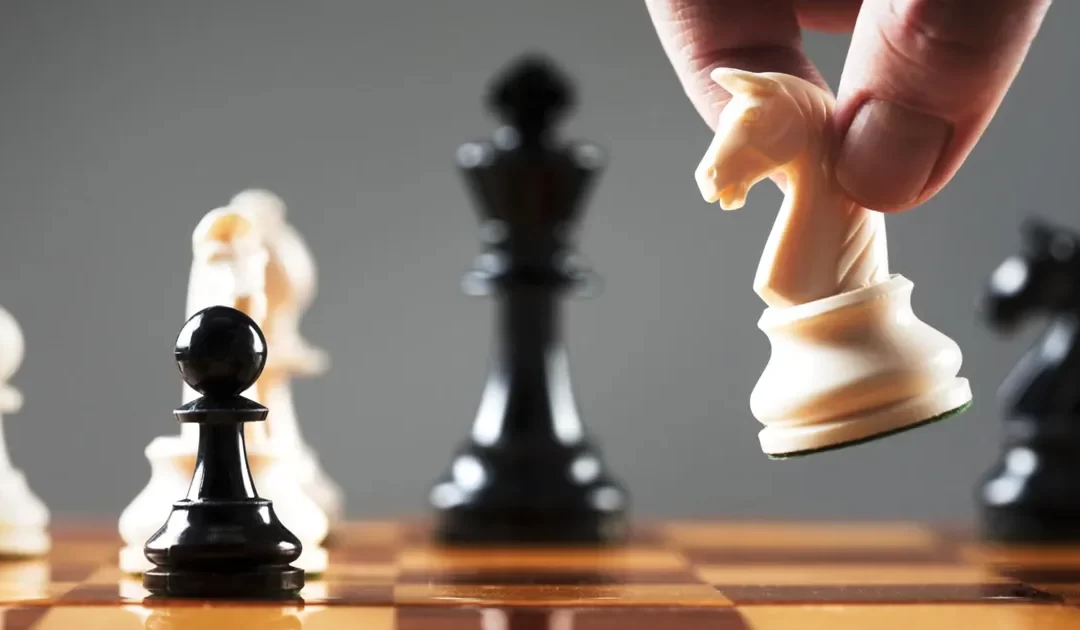Chess is a game of strategy, patience, and foresight. To be successful at chess, players must not only understand the rules and mechanics of the game but also develop the ability to think several moves ahead. This forward-thinking approach is essential to outsmarting your opponent and securing victory. Whether you are learning chess through online chess classes, attending a chess school, or receiving chess training for kids, the ability to anticipate and plan ahead can make a significant difference in your game.
In this blog, we will explore how forward-thinking plays a crucial role in chess, and how players can develop this essential skill. Online chess coaching for kids and chess training for kids offer wonderful opportunities to learn and sharpen these abilities from a young age. By the end of this article, you will understand how to develop forward-thinking skills in chess that will take your game to the next level.
The Basics of Forward-Thinking in Chess
Forward-thinking in chess refers to the ability to plan and anticipate future moves and the outcomes of different scenarios. Unlike many games where players react to the present moment, chess requires players to visualize and predict several turns ahead. This skill is crucial for both defensive and offensive strategies, as players must know how to protect their pieces while also positioning themselves for future attacks.
To develop a forward-thinking mindset, it is important to understand the concept of chess setup. Properly setting up the chessboard is not just about knowing where the pieces go; it’s about understanding the dynamics between the pieces and how each one interacts with the others. A strong chess setup provides a solid foundation for the game and can support more effective long-term planning. Understanding how pieces move, especially pawns, knights, and bishops, is crucial for anticipating potential threats and opportunities.
How Online Chess Classes Enhance Forward-Thinking Skills
Online chess classes have become a popular way for players to learn the game, especially in today’s fast-paced, digital world. These classes provide flexibility, allowing students to learn at their own pace while receiving personalized instruction. One of the main benefits of online chess coaching for kids is the ability to develop critical thinking and forward-planning skills from an early age.

Many chess training programs focus specifically on developing skills such as visualization, anticipation, and calculation. During online chess coaching for kids, children are encouraged to think ahead by exploring various possibilities and considering how their moves will affect the game. By solving chess puzzles, practicing specific openings, and analyzing classic games, kids can develop the habit of thinking several moves ahead.
These online classes often provide exercises that help players improve their ability to “see” the board more clearly and predict possible outcomes. For example, an instructor might ask a student to think about what would happen if they moved a particular piece to a certain square several turns in advance. This exercise helps students visualize the future of the game, building their forward-thinking capacity and improving their decision-making ability.
Chess Training for Kids: Encouraging a Strategic Mindset
Developing forward-thinking skills is particularly important for children who are learning chess. Chess training for kids focuses on building a strong foundation of critical thinking skills, which can then be applied to other areas of life, such as problem-solving and decision-making. By teaching kids how to think ahead, chess provides valuable life lessons in patience, strategic planning, and resilience.
Children learning chess often begin by understanding the rules and basic movements of the pieces. As they progress, they are introduced to more advanced strategies, such as the importance of controlling the center of the board and developing a flexible game plan. Chess training for kids encourages them to consider multiple outcomes for each move and think about the potential risks and rewards of each decision. This strategic mindset helps children develop a long-term approach, both in chess and in life.
The Role of Chess School in Developing Forward-Thinking
While learning chess at home or through online classes is beneficial, enrolling in a chess school offers unique advantages. A chess school provides a structured environment where players can receive in-depth training from experienced instructors. Schools often have programs tailored to players of all skill levels, from beginners to advanced players. These programs offer a combination of theoretical knowledge, practical exercises, and competitive play, which helps students develop critical chess skills.
In a chess school, students are often encouraged to engage in more complex thinking exercises, such as chess setup scenarios and tactics that require anticipating several moves ahead. With guidance from experienced trainers, students can work on specific techniques to improve their forward-thinking ability. The competitive atmosphere in a chess school also provides valuable opportunities for students to test their skills against others, reinforcing the importance of long-term planning and foresight.
Moreover, chess schools often use game analysis to help players understand the thought process behind the moves of top-level players. By analyzing famous games, students learn how grandmasters think several moves ahead, giving them insight into advanced strategies and improving their own ability to plan for the future.
Mastering Chess with Continuous Practice and Coaching
Regardless of whether you are participating in online chess classes, attending a chess school, or receiving chess training for kids, mastering forward-thinking in chess comes down to consistent practice. The more you play and analyze games, the better you become at visualizing the future of a game and predicting possible moves.
For kids especially, chess training for kids helps them not only understand the technical aspects of chess but also cultivate a habit of thoughtful, forward-looking decision-making. Through regular exercises, drills, and tactical puzzles, players learn how to calculate moves several turns ahead and recognize patterns that might be missed in the heat of the moment.
The key to becoming a forward-thinking chess player is to never stop practicing and learning. By utilizing resources like online chess coaching for kids, players can continually refine their skills and keep developing their ability to think several moves ahead. With dedication and persistence, players can master chess strategy and become formidable opponents.
Conclusion: The Importance of Forward-Thinking in Chess
Thinking ahead in chess is not just a skill—it’s a mindset. Whether you are learning the game through online chess classes, attending a chess school, or receiving chess training for kids, developing the ability to think several moves ahead is crucial for success. As players master the chess setup and develop their strategic thinking, they become more adept at anticipating their opponent’s moves, controlling the flow of the game, and positioning themselves for victory.
Forward-thinking in chess is about more than just making the right moves; it’s about seeing the bigger picture and planning for the future. For children, this skill can help develop not only their chess abilities but also their problem-solving, patience, and cognitive skills. With regular practice, guidance from coaches, and a commitment to learning, players can unlock their full potential and thrive in the game of chess.


Recent Comments